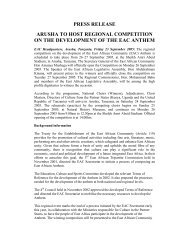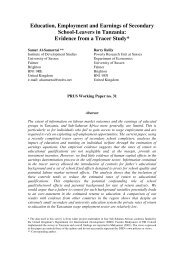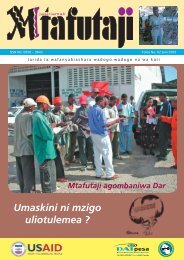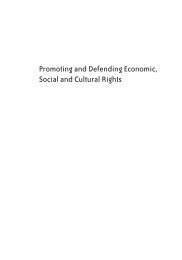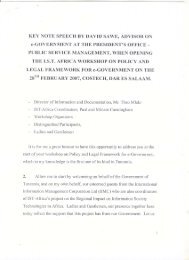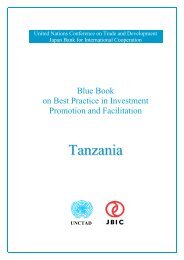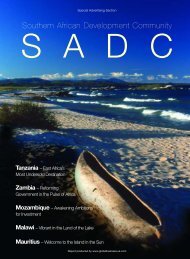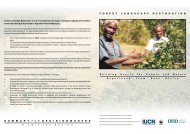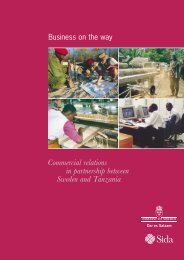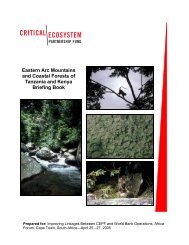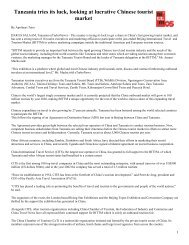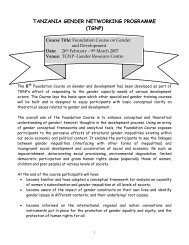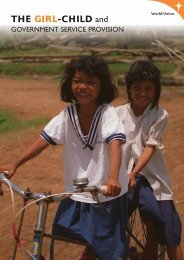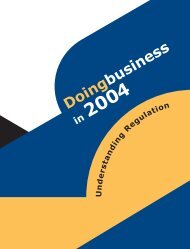CROMABU - Tanzania Development Gateway
CROMABU - Tanzania Development Gateway
CROMABU - Tanzania Development Gateway
You also want an ePaper? Increase the reach of your titles
YUMPU automatically turns print PDFs into web optimized ePapers that Google loves.
<strong>CROMABU</strong>: enhancing market opportunities for small farmers in Mwanza,<br />
<strong>Tanzania</strong><br />
By Aloyce Menda<br />
In 2001 the Crop Marketing Bureau (<strong>CROMABU</strong>) project was designed to gather and<br />
disseminate relevant information regarding crop prices in local and international markets.<br />
Basically the project is aimed at empowering small-scale farmers economically by enhancing<br />
their access to price information in trade flows. While stakeholders in the agricultural sector<br />
are demanding the government to ensure a fair-competition policy, for agricultural<br />
marketing and distribution, <strong>CROMABU</strong> (www.cromabul.com) is leveling the ground by use of<br />
modern Information and Communication Technologies (ICTs) to empower farmers. Based in<br />
Magu area of Mwanza near to the southern shores of Lake Victoria, the four-year old<br />
<strong>CROMABU</strong> project is supported by the Dutch International Institute for Communication and<br />
<strong>Development</strong> (IICD).<br />
According to <strong>CROMABU</strong> manager Ms. Naomi Massele, a professional agriculturalist with<br />
experience in management of rural agricultural and industrial projects, <strong>CROMABU</strong> comprises<br />
three components. These are the Internet Café that serves the targeted community; the<br />
price information services; and community development through information and training.<br />
<strong>CROMABU</strong>’s development phase will end in September 2006 and is regarded by IICD as a<br />
pilot project to be replicated in other rural areas with crop marketing problems.<br />
Ms. Massele explains that the project targets 16 villages directly, but the information from it<br />
circulates further. Information on crop prices gathered from local and foreign markets<br />
downloaded from the Internet are compiled by <strong>CROMABU</strong> and stored in a database.<br />
Eventually a simple price index is prepared in Ki-Swahili language and disseminated to<br />
farming villages. The youth, particularly ex-students from primary and secondary schools,<br />
are the key channel of communication between the <strong>CROMABU</strong> and the targeted small-scale<br />
farmers in Magu. They are employed as agents and use bicycles to collect and distribute all<br />
relevant documents to the villages.<br />
According to experts, four characteristics describe the powers of modern ICT in poverty<br />
reduction:<br />
• Interactivity: For the first time ICTs are effective two-way communication<br />
technologies.<br />
• Permanent availability: The new ICTs are available 24 hours a day.<br />
• Global reach: Geographic distances hardly matter any more.<br />
• Cost-effective: For most areas the relative cost of communication has been shrunk to<br />
a fraction of previous values.
The <strong>CROMABU</strong> project is aimed at doing exactly that. With NGO set-up, the project<br />
generates income from its community-training centre for peasant farmers and youth groups.<br />
It also charges fees from institutional clients in Magu, such as NGOs, for training and the<br />
Internet Café. Small-scale farmers have benefited a lot from the project. The Internet<br />
services have helped them get best markets for their produce namely cotton, groundnuts,<br />
maize, beans, finger-millet and sunflower. When prices are low in <strong>Tanzania</strong>, the Internet<br />
enables them to secure direct buyers from abroad - some of whom are sometimes ready to<br />
pay above the world market price.<br />
Before 2002, middlemen (madalali) in Magu, were conspiring to lower crop prices and reap<br />
super profit. The price of good cotton for instance is currently ranging from <strong>Tanzania</strong>n<br />
shillings 200 (US$ 0.2) to shillings 250 (US$ 0.25) for a kilogram, while before the project it<br />
could be lowered to as much as shillings 150 (US$ 0.12) to shillings 180 (US$ 0.18) per<br />
kilogram. Recent press reports said that small cotton farmers in the neighbouring Bunda<br />
district, situated about 450 kilometres from Magu in the eastern shores of Lake Victoria,<br />
refused to vend their products for shillings 180 (US$ 0.18) per kilogram to any buyer. They<br />
heard that prices are much better in Magu and hence would rather retain their cotton, which<br />
after all is imperishable product. They anticipated buyers with good prices would eventually<br />
come!<br />
Despite the remarkable success of <strong>CROMABU</strong>, the challenge remains on content issues. Most<br />
web contents are in English, which is a language of elite in <strong>Tanzania</strong>. Ki-Swahili is the official<br />
national language of 34.6 million people of <strong>Tanzania</strong>, and over 95 percent of the population<br />
can only speak, read and write in either<br />
Ki-Swahili or tribal languages and hence cannot comprehend most of the Internet’s<br />
contents, even if they get access to it.<br />
Farmers sowing seeds in <strong>Tanzania</strong><br />
Before thinking of a project on ICT for development one should comprehend the multidimensional<br />
concept of poverty. Beyond a lack of income, poverty also refers to<br />
disadvantages in access to land, credit and services (such as health and education),<br />
vulnerability (towards violence, external economic shocks, natural disasters, etc.),<br />
powerlessness and social exclusion. According to the year 2002-03 government
commissioned study titled ‘<strong>Tanzania</strong> Participatory Poverty Assessment (TzPPA)’,<br />
impoverishing forces arise from social, economic and political processes. The study<br />
concludes that the macro-economic reforms that pushed the government to withdraw from<br />
running production and market operations is among the impoverishing forces. This has<br />
affected rural population in three main areas namely: changes in marketing systems, lack of<br />
price control, and inadequate extension services.<br />
Since modern ICTs facilitate efficient creation, storage, management and dissemination of<br />
information by electronic means, they are powerful tools for fighting some of these<br />
impoverishing forces. If a poor African can send a 40-page trade document from <strong>Tanzania</strong><br />
to Cuba for just 40 cents of one US$ (Tsh 400) instead of paying US$ 50 (Tsh 50,000) to<br />
courier, then there is no doubt that modern ICTs are cost effective. “While technology<br />
shapes the future, ultimately it is people who shape technology, and who decide to what<br />
uses it can and should be put,” said Kofi Annan in his message to the Geneva World Summit<br />
on the Information Society (WSIS-I) in December 2003. <strong>CROMABU</strong> has done so before, by<br />
shaping ICTs to benefit peasant farmers in Mwanza since September 2001.<br />
For further information contact iConnect coordinator<br />
Harry Hare, harry@aitecafrica.com



